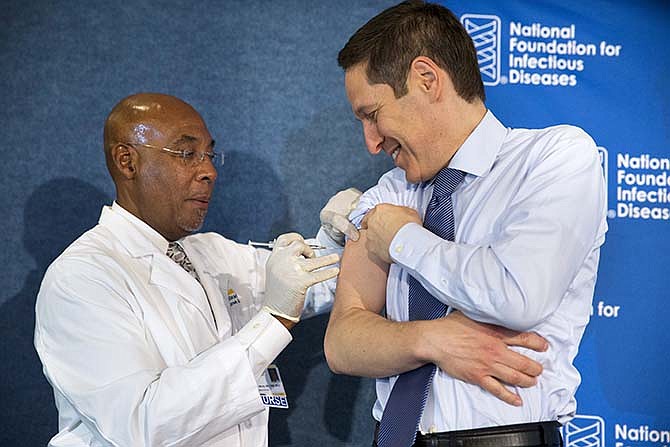ST. LOUIS (AP) - Doctors in the St. Louis area are hopeful that a change to the flu vaccine will minimize outbreaks this winter.
The St. Louis Post-Dispatch (http://bit.ly/1UVPZTw) reports that more than 54,000 Missourians were diagnosed with flu last season, the most since 2003. The U.S. Centers for Disease Control and Prevention says blame is traced to a mismatched vaccine that did not protect against most of the virus strains that made people sick.
So this year, scientists are targeting the most common strain of the virus that circulated last season. The new vaccine will still contain the deactivated 2009 H1N1 virus plus a new influenza B strain and a new H3N2 strain - the one thought to cause the most illnesses last season.
Doctors in the St. Louis area are hopeful that a change to the flu vaccine will minimize outbreaks this winter.
"Every year we start over, and we have a new season," said Nicole Gattas, an associate professor of pharmacy practice at St. Louis College of Pharmacy. "If you do get your flu vaccine and it's not a complete match, you're still more likely to have a less severe flu if you get it. Even in a mismatched year you can still see some benefits."
Experts say now is the time to get vaccinated because flu viruses typically begin circulating in October and November. It can take 2-3 weeks to develop immunity after receiving the shot.
Flu activity is unpredictable. In the St. Louis region, doctors saw two spikes in illnesses last winter, the first in December and January and then again in March.
"It's a guessing game every year," said Dr. Cassandra Haddox, an emergency room physician at St. Anthony's Medical Center in south St. Louis County. "Getting the vaccine definitely helps."
Still, less than 50 percent of the U.S. population gets vaccinated each year. High-risk groups including pregnant women, people older than 65 and those with compromised immune systems are especially urged to get the shot.
Researchers at the Saint Louis University Center for Vaccine Development are working on a universal flu vaccine with a goal of covering a broader spectrum of virus strains and an immunity that would last several years. Dr. Sharon Frey of the center said the experimental vaccine is at least a few years away from the market.

